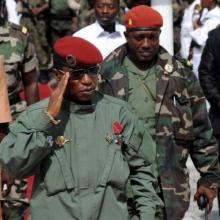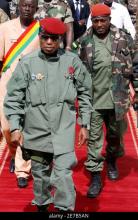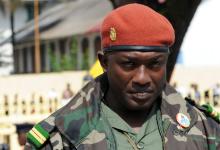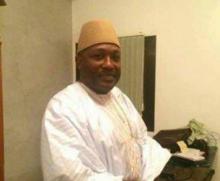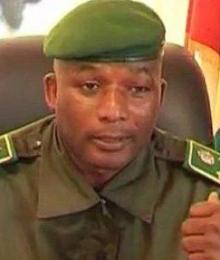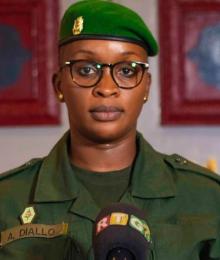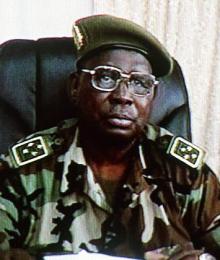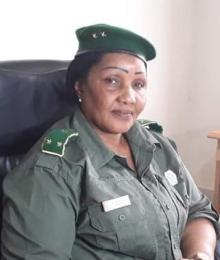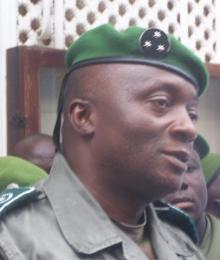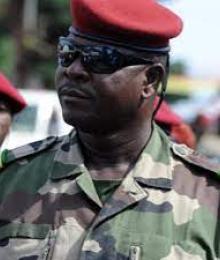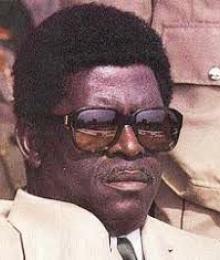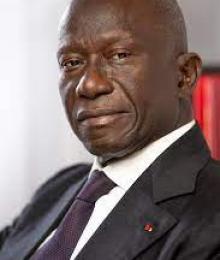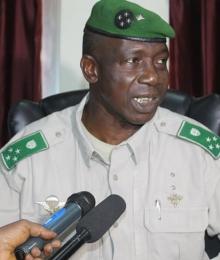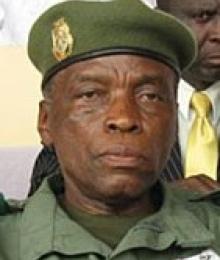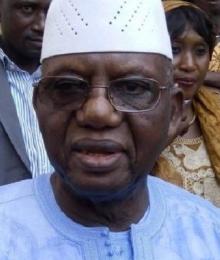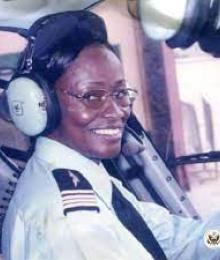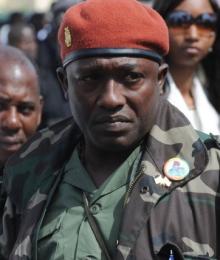
Toumba Diakite, whose real name was Aboubacar Sidiki Diakité, was a Guinean military doctor once promised a bright future in his country's army. From a family of respected soldiers, he quickly climbed the ladder thanks to his skills and dedication to the arms profession. However, his career took a tragic turn when he became the camp assistant and head of the presidential guard of coup captain Moussa Dadis Camara in 2008.
This strategic position made him one of the main actors in the bloody massacre of 28 September 2009 in Conakry, where more than 150 demonstrators were killed and dozens of women raped. Accused of being the coordinator of this violent repression called a crime against humanity, Toumba Diakité then went undercover for seven years before being arrested and extradited for trial in Guinea starting in 2022.
Introduction
Toumba Diakité, whose real name was Aboubacar Sidiki Diakite, was once a military doctor promised a bright future in the Guinean army. From a family of respected soldiers, he quickly climbed the ladder, forging a strong reputation for competence and dedication to the service of his country. However, the trajectory of this venerable officer took a tragic turn when he became the camp assistant and head of the presidential guard of coup captain Moussa Dadis Camara in 2008. This strategic position placed him at the heart of the military junta's despotic power, making him one of the main actors in the bloody massacre of September 28, 2009 in Conakry.
Childhood and Education
Born on April 30, 1968 in Conakry, Toumba Diakité grew up in a military family. His father, retired Colonel Mamadi Diakité, served for 14 years in the Presidential Guard under the First Republic of Guinea. It is probably this family influence that prompted the young Aboubacar Sidiki to embrace the arms career from an early age.
After graduate studies, the details of which are unknown, Toumba joined the Guinean army as a military doctor. His skills and dedication enable him to climb the ladder quickly. He is noted for his uprightness and his keen sense of duty, qualities appreciated in the armed forces.
Military Career
Toumba Diakité's early years in the army remain a mystery. He is known to have participated in several operations aimed at securing borders andining order in Guinea. However, some rumors suggest that he may have been involved in abuses and acts of corruption during this troubled period.
Despite these noises from the hallways, Toumba's reputation as a finest strategist was no longer to be rebuilt when Captain Moussa Dadis Camara took power by force in December 2008 after the death of President Lansana Conté. The strength ratio between the two men is changing forever.
Aide of Camp of Dadis Camara
In 2008, Toumba Diakité was appointed camp assistant to Guinea's new strongman, Moussa Dadis Camara. He also became the head of the presidential guard, a strategic post that gave him immense power within the military regime.
The exact reasons for this brilliant promotion remain unclear. But dedicated loyalty to Dadis Camara and the tender personal ties that seem to unite them probably played a decisive role. Some insistent rumors even suggest that Toumba may have exercised a mystical influence on the coup captain.
Whatever the reason, Toumba finds himself at the forefront of de facto power in Guinea. As the right arm of Dadis Camara, he was closely involved in the management of the country's affairs and the command of the army. His influence grew from day to day, to the tide of a part of the junta who perceived him as a threat.
Massacre of September 28, 2009
September 28, 2009 marked a tragic turn in the descent to the hell of Toumba Diakité. On that day, a peaceful demonstration of the Guinean opposition gathered at the Conakry Stadium was suppressed in a bloodbath by law enforcement forces.
According to numerous testimony, Toumba was the architect of this violent repression that claimed the lives of more than 150 people and saw dozens of women being raped. As Chief of the Presidential Guard, he would have coordinated the deployment of troops that opened fire with heavy weapons on unarmed civilians.
Human rights organizations accuse Toumba of being the main culprit for this massacre, which is considered a crime against humanity. His actions have shocked the international community and sparked a wind of reproach in Guinea and abroad.
Assassination attempt against Dadis Camara
Three months after the September 28 tragedy, relations between Toumba Diakité and Moussa Dadis Camara, his mentor who became the target, deteriorate dangerously. On December 3, 2009, a violent fight broke out between the two men at the Koundara military camp.
According to testimony, Toumba attempted to assassinate the chief of the junta with a gun, seriously injuring him. In an interview with RFI a few days later, the former camp assistant claimed to have acted to prevent Dadis from blaming him for the massacre.
This failed assassination attempt marks the final break between the two men. Toumba Diakité takes the run, marking the beginning of a long march intercepted by a few reappearances noticed in the media to launch diatribes against her former protector.
Life of Exile and Hunting
Followed by an international arrest warrant, Toumba Diakité then begins a long period of wandering and clandestinity that will last 7 years. Forced to flee Guinea, he temporarily finds refuge in the Gambia before joining neighbouring Senegal where he establishes a new identity.
But even as a refugee on the other side of West Africa, Dadis Camara’s former right arm cannot escape indefinitely from his country’s ever-larger arm of justice. Trapped by the law enforcement forces, he has to land in clandestinity, living in fear of being arrested at any time.
From the depths of his hiding, however, Toumba continues to speak to reaffirm his political vision. It calls for democracy in Guinea, while advocating its own cause in the international community. His positions are indignant but allow him to remain an unavoidable opposition figure.
The Trial of the Massacre of September 28, 2009
It was finally in Dakar, the Senegalese capital, that the hunt ended in December 2016. After seven years in custody, Toumba Diakité is arrested by the law enforcement in troubled circumstances. A few weeks later, he was extradited to Guinea for trial. His trial for the bloody events of September 2009 began in Conakry on September 28, 2022, day by day 13 years after the tragedy.
Toumba Diakité faces heavier charges: crimes against humanity, murders, rape, torture and other serious human rights violations. Its leading role in organizing and killing the demonstration is at the heart of the debate. For several weeks, the Kaloum Special Court listened to the frozen testimony of the victims, experts and other accused. In a harsh and tense climate, Toumba fiercely denies the facts that are accused of him, while others, including former relatives, blame him.
The involvement of victims and their families in the trial is crucial to establishing the truth and shedding light on individual responsibilities. Despite the pressure and intimidation, many witnesses do not hesitate to point to Dadis Camara's former camp assistant as the instigator of the massacre.
The verdict of this historic trial is expected in the coming months. If found guilty, Toumba Diakité risks a severe sentence of life imprisonment, or even the death penalty still in force in Guinea. Whatever the outcome, this legal battle marks an essential step towards truth and justice for the victims.
Awards and Recognitions
Despite the decline of his career, Toumba Diakité continues to enjoy a certain prestige among a fraction of the Guinean population. In 2023, he was named "Guinean Personality of the Year" by the news site Guinéenews, a very controversial choice.
His supporters refer to his past as a brave and patriotic soldier, and portray him as a man of integrity and dedication to his nation despite his tragic errors. Others, more critical, see in it the unhealthy worship of a butcher who betrayed his oath of officer. For the families of the victims and human rights defenders, this recognition is an insult to the memory of the martyrs of 28 September and a spit on the faces of those who are still waiting for justice.
Conclusion
The fate of Toumba Diakité remains today pending, awaiting the long-awaited verdict of his historic trial. But whatever the sentence, its course illustrates how the greed for power can lead a man to the worst atrocities. From a military doctor to respected service to the zealous apparatchik of a criminal junta, Toumba's trajectory recalls the terrible drifts and turns that have marked the history of post-independence Guinea.
The fall of this man who has become a murderer also symbolizes the hope of a nation to reconcile with its tumultuous past, and the firm desire of the Guineans to end the cycle of violence that has for too long enamelled their young democracy.
Judging those responsible for the worst crimes committed during the chaotic political transition of the 2000s, Guinea is sending a strong signal to its current and future leaders. No one is above the law, and abuses against the people will not remain unpunished. It is at this price that the country will finally be able to rebuild itself and move on to a lasting peace and a strong rule of law.











